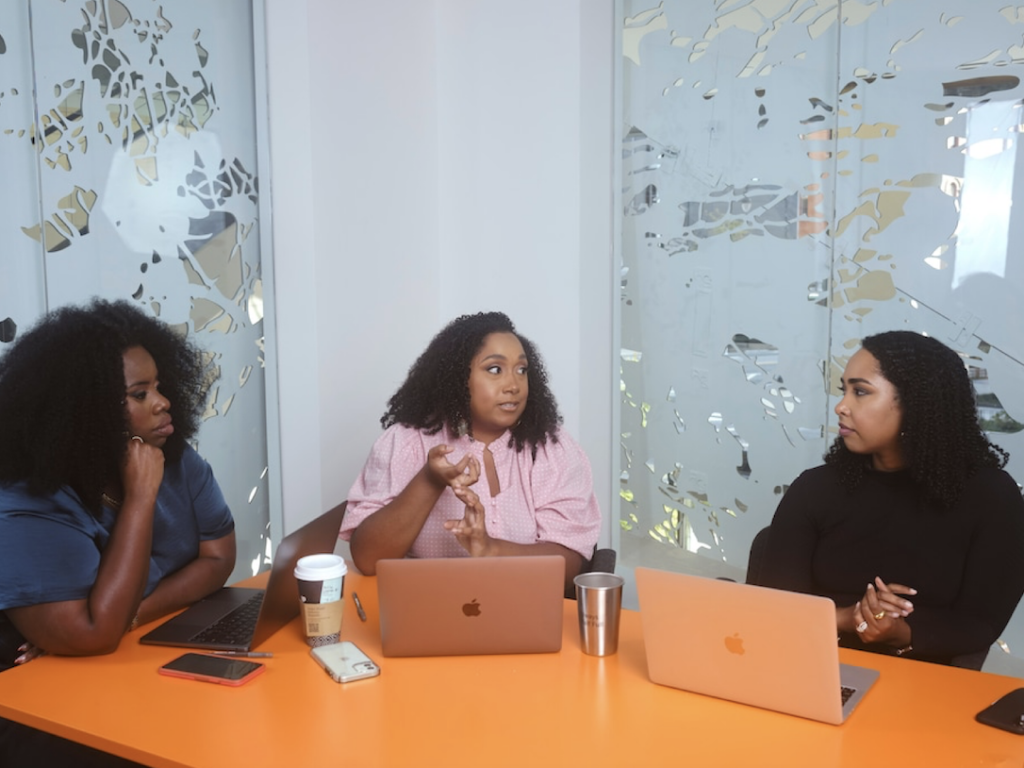 Elahe Izadi
Elahe Izadi
“I just became so consumed with what do Black people need from journalism in this moment,” recalled Ofori-Atta, who was then the managing editor of the Trace, a nonprofit news site, “and what is the best way for me to use my talents and experiences to deliver that.”
Over text messages the two friends, both top editors in their respective newsrooms, decided it was time to pursue the dream they first envisioned when they were both working at the Root a decade earlier: start their own publication, dedicated to delivering hard news and investigative reporting aimed at a Black audience.
Their new site, the nonprofit Capital B, launched Monday morning with $9 million in philanthropic backing — the Ford Foundation and the American Journalism Project are their biggest funders — and a staff of 16 that they expect to expand to 27 soon.
They’re starting their work at a time when many large newspapers and television networks have pledged to hire and promote more Black journalists and prioritize coverage of race. But most of those efforts will ultimately serve “storytelling about Black people and Black issues for White people,” said Williams, formerly the editor in chief of Vox and now Capital B’s chief executive. “We wanted to create something that wasn’t just going to do that.”
For example, the coverage of the ongoing fight over how race is taught in schools. “It took a really, really, really long time in the evolution of the ‘critical race theory’ conversation for mainstream news organizations to say, ‘Oh, what does a Black family think about this?’” said editorial director Simone Sebastian, formerly an editor at The Washington Post. “It will be our job at Capital B to ask that question from the very beginning.”
The site launched with a team dedicated to national reporting and one focused on Atlanta, with plans for more local newsrooms soon. Coverage will center on health, criminal justice, politics and education, and some stories will be made available to other news organizations that partner with Capital B.
On its first day, Capital B’s site published a profile of a housing activist turned reluctant politician, elected during the blue wave that put many Black liberals in office; a feature on the “false promise” of hiring Black police chiefs after high-profile incidents; and the 1994 crime bill’s lingering impact on higher education in the prison system. Capital B’s Atlanta site published a guide to using free at-home coronavirustests, a piece on Black homeowners fighting eviction and what locals said in a series of meetings and interviews about what they wanted from news media.
Capital B’s mission echoes the sensibility of the Black press dating back to the early 1800s, said Richard Prince, a longtime advocate and chronicler of diversity in the media industry. “They’re not about both sides-ism, and they’re willing to and eager to give voice to people who don’t have that kind of voice,” he said.
While mainstream newspapers heralded the 1915 Ku Klux Klan-glorifying film “Birth of a Nation” as a cinematic achievement, Black newspapers denounced it as dangerous. The 1921 Tulsa race massacre was incited in part by lurid, sensationalist stories in the White-owned Tulsa Tribune and then ignored for decades by the mainstream press, Prince noted. “If you want to find the truth about what was going on,” Prince said, “you have to go to the Black press because the White press just wasn’t doing the job.”
In recent years, Black newspapers have suffered some of the same readership and revenue drops as the broader media industry, though some executives maintain they’ve long faced a disparity in claiming ad dollars. But there have also been efforts to bolster the Black press, including “Word in Black,” a collaboration among 10 prominent publishers, and new local digital platforms, such as Chicago’s the Triibe.
The Black Media Initiative, housed in City University of New York’s journalism school, counts at least 378 Black media outlets across the country. A recent study by the center found that during 18 months of the pandemic, Black media mentioned race or racism in one of every four news stories, compared with one in 10 among mainstream media, and offered about five times as much coverage of racial health disparities during the pandemic.
Stories like these, said Black Media Initiative director Cheryl Thompson-Morton, justify the continued need for a Black press even as the mainstream media promises to pursue a greater inclusiveness in its coverage.
“Black media still provides the news with cultural context, a different perspective, historical context,” she said. “It just does it in a way that is uniquely Black, for lack of a better way to say it.”
Williams said she still fields questions about whether the world needs another Black media outlet. “Decades ago, there used to be like three newspapers in a town, and people used to have options,” she said. “We’re not trying to be the only one, and we don’t think we should be. We think a community deserves options.”
Meanwhile, there has been no shortage lately of digital-media start-ups seeking a foothold in even more crowded markets — from Grid News, an explainer-heavy site that launched this month with a reported $10 million in financing; to the as-yet-unnamed global news site from former Bloomberg chief executive Justin Smith and former New York Times columnist Ben Smith (who in an interview spoke of the “200 million college-educated people who speak English around the world” as an underserved audience).
Unlike those outlets, Capital B’s founders are pursuing a nonprofit model — reasoning that they can draw support from donors who shared their values “as opposed to the much more complicated situation with advertisers who just don’t want to put their ads next to anything controversial,” Williams said. “That’s just really impossible when you’re writing about criminal justice or pretty much most things that we would be publishing on Capital B.” And a subscription model — requiring people to pay for their reporting — would shut out readers they want to serve, they say.
They are, however, seeking corporate underwriting of events, podcasts and other products. Many businesses pledged in 2020 to support issues important to the Black community; Capital B will ask corporations “to live up to their stated values,” said Gillian White, Capital B’s senior vice president of revenue and programming.
Capital B’s vision helped lure several Black journalists from secure jobs at established news organizations, many of them, like Sebastian, exhausted after the summer of 2020, “having to play the ‘both sides’ and explaining what is obvious to me to folks that it isn’t obvious to, both inside and outside of the newsroom,” she said.
“That’s not a comment on the quality of journalism that The Washington Post or anybody else produced,” Sebastian added. “It’s just a fact of being a Black journalist working in a mainstream newsroom. It is hard to over and over again have to explain why this moment is so gut-wrenching.”
White, previously a managing editor at The Atlantic, said there can be immense pressure being one of the few, or the only, Black woman in the room, “fighting for the lens through which you see the world to be seen,” while knowing Black America “is not a monolith.”
“I wanted to, instead of sitting on a perch at a White institution and trying to occasionally get that work done,” she said, “really do that work every single day.”
This story has been updated since the Capital B’s national website went live on Monday.
Their new site, the nonprofit Capital B, launched Monday morning with $9 million in philanthropic backing — the Ford Foundation and the American Journalism Project are their biggest funders — and a staff of 16 that they expect to expand to 27 soon.
They’re starting their work at a time when many large newspapers and television networks have pledged to hire and promote more Black journalists and prioritize coverage of race. But most of those efforts will ultimately serve “storytelling about Black people and Black issues for White people,” said Williams, formerly the editor in chief of Vox and now Capital B’s chief executive. “We wanted to create something that wasn’t just going to do that.”
For example, the coverage of the ongoing fight over how race is taught in schools. “It took a really, really, really long time in the evolution of the ‘critical race theory’ conversation for mainstream news organizations to say, ‘Oh, what does a Black family think about this?’” said editorial director Simone Sebastian, formerly an editor at The Washington Post. “It will be our job at Capital B to ask that question from the very beginning.”
The site launched with a team dedicated to national reporting and one focused on Atlanta, with plans for more local newsrooms soon. Coverage will center on health, criminal justice, politics and education, and some stories will be made available to other news organizations that partner with Capital B.
On its first day, Capital B’s site published a profile of a housing activist turned reluctant politician, elected during the blue wave that put many Black liberals in office; a feature on the “false promise” of hiring Black police chiefs after high-profile incidents; and the 1994 crime bill’s lingering impact on higher education in the prison system. Capital B’s Atlanta site published a guide to using free at-home coronavirustests, a piece on Black homeowners fighting eviction and what locals said in a series of meetings and interviews about what they wanted from news media.
Capital B’s mission echoes the sensibility of the Black press dating back to the early 1800s, said Richard Prince, a longtime advocate and chronicler of diversity in the media industry. “They’re not about both sides-ism, and they’re willing to and eager to give voice to people who don’t have that kind of voice,” he said.
While mainstream newspapers heralded the 1915 Ku Klux Klan-glorifying film “Birth of a Nation” as a cinematic achievement, Black newspapers denounced it as dangerous. The 1921 Tulsa race massacre was incited in part by lurid, sensationalist stories in the White-owned Tulsa Tribune and then ignored for decades by the mainstream press, Prince noted. “If you want to find the truth about what was going on,” Prince said, “you have to go to the Black press because the White press just wasn’t doing the job.”
In recent years, Black newspapers have suffered some of the same readership and revenue drops as the broader media industry, though some executives maintain they’ve long faced a disparity in claiming ad dollars. But there have also been efforts to bolster the Black press, including “Word in Black,” a collaboration among 10 prominent publishers, and new local digital platforms, such as Chicago’s the Triibe.
The Black Media Initiative, housed in City University of New York’s journalism school, counts at least 378 Black media outlets across the country. A recent study by the center found that during 18 months of the pandemic, Black media mentioned race or racism in one of every four news stories, compared with one in 10 among mainstream media, and offered about five times as much coverage of racial health disparities during the pandemic.
Stories like these, said Black Media Initiative director Cheryl Thompson-Morton, justify the continued need for a Black press even as the mainstream media promises to pursue a greater inclusiveness in its coverage.
“Black media still provides the news with cultural context, a different perspective, historical context,” she said. “It just does it in a way that is uniquely Black, for lack of a better way to say it.”
Williams said she still fields questions about whether the world needs another Black media outlet. “Decades ago, there used to be like three newspapers in a town, and people used to have options,” she said. “We’re not trying to be the only one, and we don’t think we should be. We think a community deserves options.”
Meanwhile, there has been no shortage lately of digital-media start-ups seeking a foothold in even more crowded markets — from Grid News, an explainer-heavy site that launched this month with a reported $10 million in financing; to the as-yet-unnamed global news site from former Bloomberg chief executive Justin Smith and former New York Times columnist Ben Smith (who in an interview spoke of the “200 million college-educated people who speak English around the world” as an underserved audience).
Unlike those outlets, Capital B’s founders are pursuing a nonprofit model — reasoning that they can draw support from donors who shared their values “as opposed to the much more complicated situation with advertisers who just don’t want to put their ads next to anything controversial,” Williams said. “That’s just really impossible when you’re writing about criminal justice or pretty much most things that we would be publishing on Capital B.” And a subscription model — requiring people to pay for their reporting — would shut out readers they want to serve, they say.
They are, however, seeking corporate underwriting of events, podcasts and other products. Many businesses pledged in 2020 to support issues important to the Black community; Capital B will ask corporations “to live up to their stated values,” said Gillian White, Capital B’s senior vice president of revenue and programming.
Capital B’s vision helped lure several Black journalists from secure jobs at established news organizations, many of them, like Sebastian, exhausted after the summer of 2020, “having to play the ‘both sides’ and explaining what is obvious to me to folks that it isn’t obvious to, both inside and outside of the newsroom,” she said.
“That’s not a comment on the quality of journalism that The Washington Post or anybody else produced,” Sebastian added. “It’s just a fact of being a Black journalist working in a mainstream newsroom. It is hard to over and over again have to explain why this moment is so gut-wrenching.”
White, previously a managing editor at The Atlantic, said there can be immense pressure being one of the few, or the only, Black woman in the room, “fighting for the lens through which you see the world to be seen,” while knowing Black America “is not a monolith.”
“I wanted to, instead of sitting on a perch at a White institution and trying to occasionally get that work done,” she said, “really do that work every single day.”
This story has been updated since the Capital B’s national website went live on Monday.




